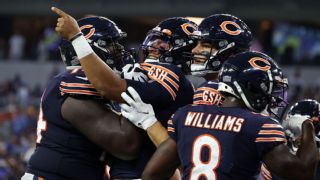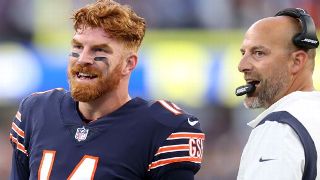|
LAKE FOREST, Ill. – When the Chicago Bears host the Cincinnati Bengals on Sunday (1 p.m. ET, Fox), the spotlight will be on two young quarterbacks -- and two different approaches. Cincinnati’s Joe Burrow and Chicago’s Justin Fields both experienced top-end success in college: Burrow at LSU, where he won a national championship and Heisman Trophy, and Fields at Ohio State where he went 20-2 as a starter. Burrow was selected first overall in the 2020 NFL draft, and Fields was the No. 11 pick this spring. Both are expected to serve as franchise quarterbacks. The contrast revolves around each quarterback’s NFL timeline. The Bengals wasted no time anointing Burrow as the starter, cutting ties with former franchise quarterback Andy Dalton in the process. The Bengals’ plan called for Burrow to start his entire rookie season. Unfortunately, a left knee injury suffered Nov. 22, 2020 ended his first year. The Bears, on the other hand, signed Dalton to a one-year $10 million contract before the draft, and even after Chicago jumped up nine spots to take Fields, it reaffirmed its commitment to Dalton opening the 2021 season as the starter. It took one week into the regular season for the inevitable outcry from a fan base starved for a franchise quarterback to demand Fields be the starter. Fields played five snaps in Sunday night’s 34-14 loss to the Los Angeles Rams, but he made the most of them, including scoring on a three-yard run. Bears fans see rookie QBs starting in Jacksonville, New England and with the Jets, and they watched Burrow start his first game last year, so why wait? That’s one of the topics I discuss with ESPN Bengals reporter Ben Baby, who covered Burrow’s rookie year. Ben, having watched Burrow last year, what do you make of how the Bears have handled Fields thus far?  Baby: The logic certainly checks out if you’re the Bears. Remember, the most important thing isn’t Matt Nagy’s coaching future with the franchise -- it’s about making sure Fields is brought along in a manner that will facilitate long-term success. Burrow and Fields, while both young and exciting prospects, entered the NFL with wildly different levels of college experience. Burrow was a fifth-year senior who capped his college career with a 15-game season. Fields, on the other hand, turned pro after three years in college. Only one of them, his 2019 year at Ohio State, was a traditional year. Fields’ last season was the pandemic-shortened 2020 season that featured eight games. Burrow had 906 pass attempts at LSU. Fields had 579. Naturally, it makes sense if Chicago wants to make sure Fields is ready to be a full-time NFL quarterback, a situation that one other rookie, San Francisco’s Trey Lance, is also experiencing. Conventional wisdom has suggested that putting a quarterback into a high-leverage role too early may hurt his confidence long-term if he doesn’t find immediate success, much like a fighter taking on a tough test too soon in his career. However, given the advancement of offenses from the high school level upward, more quarterbacks are adequately prepared for more responsibilities than perhaps their counterparts from previous eras. JD, what do you make of the Bears’ strategy? Dickerson: I understand it, to a point. The last thing the Bears want to do is rush Fields out there before he is ready -- a la Mitchell Trubisky, who never lived up to being the No. 2 draft pick and is now in Buffalo -- but the longer the offense struggles, the tougher it will be to keep Fields on the bench. Fields is not Trubisky, who started one-year at North Carolina before Chicago inexplicably traded up to draft him second in 2017. Fields played the best competition at Ohio State, and led the Buckeyes to the college playoffs. Fields had a signature win over Clemson. Trubisky lost the Sun Bowl to Stanford. You see my point. Dalton is decent, but the Bears need better. The cast of characters on offense is average, at best. Fields could make a difference. It’s not a matter of if, but when the Bears make the move. Ben, when you look at their situations, how different was it for Burrow when he entered the league two years ago?  Baby: It was much different, and Dalton helps explain the difference. Dalton, as one might recall, was the Bengals’ starter since they drafted him in 2011 all the way until the 2019 season. He was under contract for 2020. However, with the No. 1 pick in hand and Burrow on the draft board, the Bengals ultimately decided having Dalton didn’t make sense. So they spent the money in free agency, drafted Burrow and eventually cut Dalton. Even before the Bengals drafted Burrow, it was a vote of confidence in his ability to immediately join the franchise and be a Week 1 starter. When Bengals coach Zac Taylor was asked about it on Wednesday, he rattled off a slew of traits the team liked, including a very key intangible -- his ability to win in all circumstances. “It’s just in him,” Taylor said. “Wherever that comes from — his dad, the way he’s brought up, I don’t know. But he’s got it. And we’re glad he’s got it.” Chicago, on the other hand, did the opposite. The Bears signed Dalton after one year in Dallas, essentially giving the team some insurance and an experienced starter a month before drafting Fields. That being said, Jeff, when do you think the Bears will turn to Fields? Dickerson: Originally, I predicted Fields would take over no later than Week 7. After last weekend, I’m not sure Dalton makes it to Week 4. And let me be clear: Dalton is not a bad quarterback or the main problem on offense. But the Bears have so many issues -- vertical passing attack, offensive line play, questionable decision-making -- that I cannot see Dalton being able to overcome all of that. Maybe Fields won’t either, but they have a better shot with Fields’ athleticism. I understand the worry Fields might not be ready. There have been plenty of great quarterbacks forced to wait their turn. But Aaron Rodgers played behind Brett Favre. Steve Young behind Joe Montana. Patrick Mahomes behind Alex Smith, who had a terrific year for the Chiefs in 2017. Dalton is simply….average. He’s not the caliber of quarterback you force a young guy to sit behind for very long. Let’s get to the heart of the matter, Ben. Which of the two quarterbacks do you believe will have the better NFL career?  Baby: Do you want my Social Security number too, Jeff? Because I might be more comfortable giving that up before I light my Twitter mentions ablaze by picking Fields or Burrow. But in all seriousness, it’s really hard to tell right now based on their respective sample sizes. We don’t have a full year of NFL data for Burrow or Fields, and we won’t get that until 2022 at the earliest. With all these young quarterbacks, it’s important to note that one doesn’t need to be necessarily better than the other. Given how ready rookies are to step into NFL starting roles, the ability of quarterback play has risen exponentially in recent years. Here’s the bigger question? Can front offices and coaching staffs make the necessary moves and adjustments to support their young stars? The track record for both franchises hasn’t been ideal in recent years. Field and Burrow have proven they can play a little bit. But their respective organizations still have a lot to prove. How Chicago handles Fields moving forward is a prime example of that. Dickerson: I’ll keep it simple. The Bears have not developed a franchise quarterback in 70 years! The ghost of Sid Luckman still haunts Halas Hall. As much as I would like to say Fields is destined to have the better career, Chicago sports fans haven’t seen the quarterback scenario play out the right way long-term since WWII raged in Europe and the Pacific. Both are supremely talented, but history is on Burrow’s side in this equation.
|
